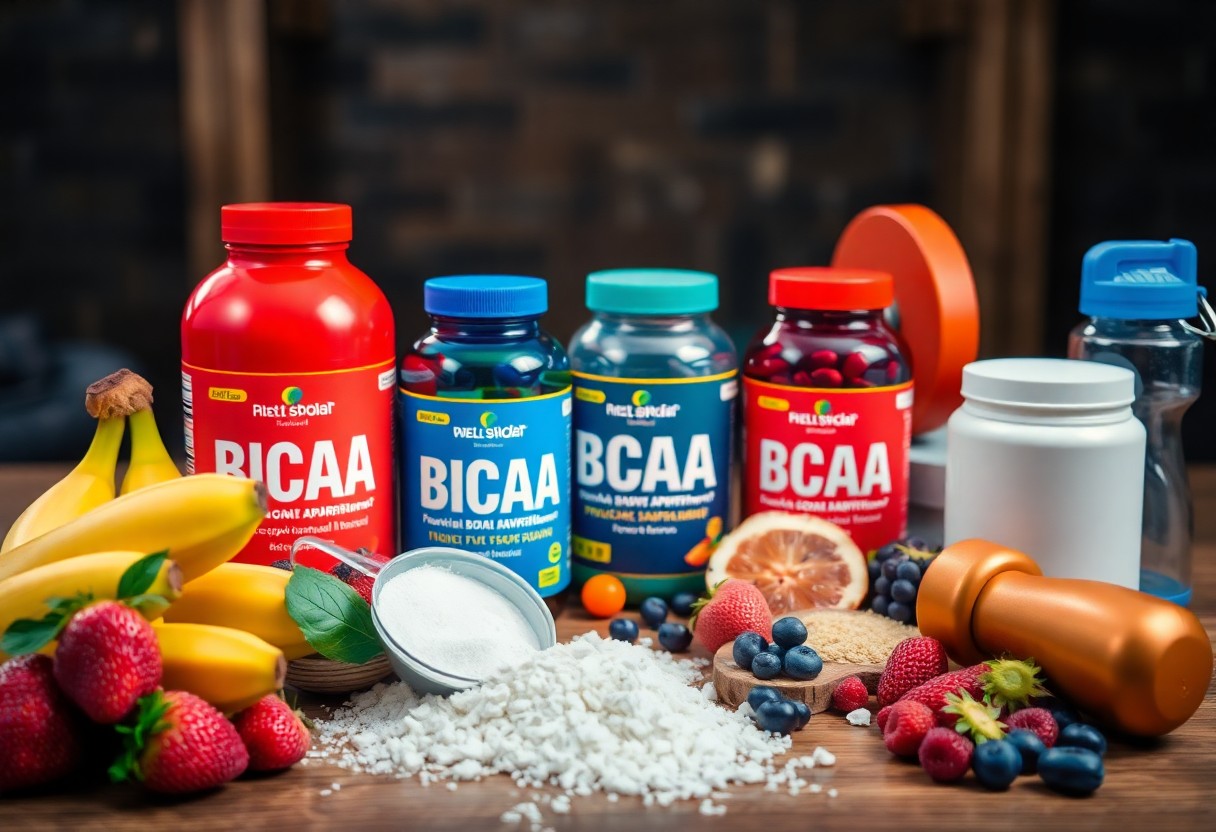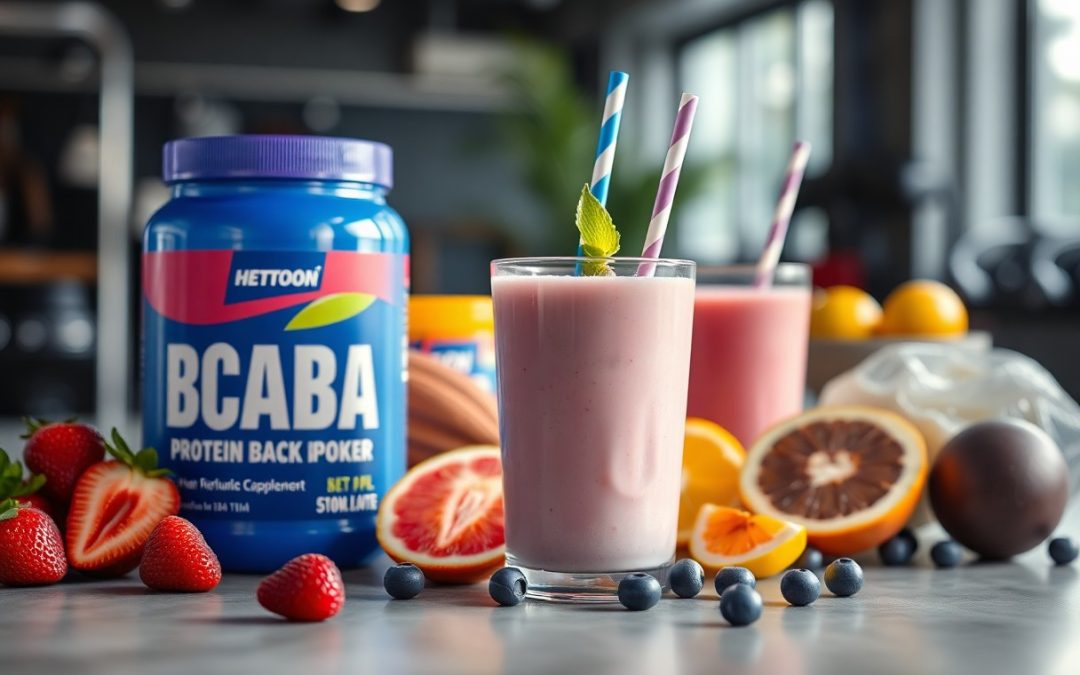You may be familiar with branched-chain amino acids, or BCAAs, which play a significant role in muscle growth and exercise performance. These vital amino acids—leucine, isoleucine, and valine—offer a range of benefits, from enhancing athletic performance to supporting muscle retention during illness. In this post, we will explore the various advantages of incorporating BCAAs into your diet and how they can contribute to your overall health and fitness goals.
Understanding BCAAs
To comprehend the significance of BCAAs, it’s vital to know that they are branched-chain amino acids, which play an important role in muscle recovery and growth. These amino acids are vital for anyone engaging in workouts or seeking to improve athletic performance, as they can help reduce fatigue during exercise and support lean muscle mass development.
Definition and Importance
Against popular belief, BCAAs are not just for bodybuilders; they are vital amino acids vital for everyone’s protein needs. They aid in muscle repair, decrease soreness, and can improve performance, making them important for both fitness enthusiasts and people with chronic illnesses looking to maintain muscle mass.
Types of BCAAs
Before diving deeper, it’s helpful to know the three main types of BCAAs: leucine, isoleucine, and valine. Each of these plays a unique role in muscle function and metabolism. Here’s a quick overview:
| Type | Role |
| Leucine | Stimulates muscle protein synthesis |
| Isoleucine | Supports energy production |
| Valine | Aids in muscle recovery |
| Combined Effects | Promote overall muscle health |
| Availability | Found in various foods and supplements |
Hence, knowing the types of BCAAs allows you to understand their unique contributions to your fitness goals. Consider incorporating them into your routine for the following benefits:
- Muscle recovery and repair
- Reduced exercise fatigue
- Improved endurance
- Support for lean muscle mass
- Potential benefits in chronic diseases
The tailored benefits of BCAAs highlight their crucial role in optimizing your health and performance.
Health Benefits of BCAAs
While BCAAs, or branched-chain amino acids, are often recognized for their role in enhancing muscle growth and performance, they offer additional health benefits that can positively impact your well-being. Research suggests that BCAAs may help improve exercise performance, preserve lean muscle mass, and even support individuals with certain chronic conditions, making them a valuable addition to your diet and supplement regimen.
Exercise Performance Improvement
Between various studies, BCAA supplementation has demonstrated potential in reducing exercise fatigue and improving endurance. For example, research involving college-age males showed that those who consumed BCAAs experienced lower serotonin levels during high-intensity exercise, which may help delay fatigue and enhance overall exercise performance.
Preservation of Lean Muscle Mass
Mass loss of muscle can be a significant concern, especially if you are dealing with chronic illnesses. BCAA supplementation, particularly leucine, has shown promise in helping maintain your lean muscle mass. Evidence from a review highlights that a high-protein diet rich in leucine can protect against muscle loss during conditions like cancer, ensuring that you keep your strength and vitality even in challenging times.
To further understand the impact of BCAAs on muscle preservation, consider the findings from a 2012 review that emphasized the role of leucine in protein synthesis. By incorporating BCAAs into your diet, you may not only improve your body composition but also better support your overall health, especially if facing chronic ailments that typically lead to muscle deterioration. This proactive approach can significantly contribute to maintaining your muscle strength and function.

BCAAs in Disease Management
There’s increasing interest in the role of BCAAs for managing chronic illnesses. Research suggests that these important amino acids may help maintain muscle mass and support overall health in individuals facing various health challenges, particularly when conventional nutrition may fall short.
Role During Illness
To maintain muscle mass during illness, particularly chronic conditions, incorporating BCAAs into your diet can be beneficial. High-protein diets enriched with leucine, one of the BCAAs, have shown promise in preventing muscle loss associated with diseases such as cancer and other debilitating conditions.
Impact on Liver Disease
Above all, BCAAs can have a positive impact on liver disease management. Studies indicate that supplementation may improve outcomes in individuals with liver cirrhosis, helping to boost muscle strength and potentially enhance your overall prognosis.
Disease progression in liver conditions is closely monitored with the Model for End-Stage Liver Disease (MELD) scores. Research from 2017 indicated that individuals consuming BCAA supplements experienced significant improvements in these scores over two years, highlighting their beneficial role. By supporting muscle integrity and promoting better physical function, BCAAs can contribute to a more favorable clinical course for those with liver disease, making them a valuable addition to your dietary strategy.
Muscle Recovery and Damage Reduction
After intense exercise, you may experience muscle soreness and fatigue, but incorporating BCAAs into your recovery plan can significantly enhance muscle recovery and reduce discomfort. Studies suggest that BCAAs can lower markers of muscle damage, allowing you to bounce back more quickly and maintain your workout schedule.
BCAAs and Muscle Damage
Damage to your muscles is an inevitable part of rigorous training, but BCAAs can help mitigate this issue. A systematic review found that supplementation may reduce muscle damage during high-intensity workouts, which is beneficial for athletes looking to maximize their performance.
Effects on Recovery Post-Exercise
To facilitate faster recovery after your workouts, BCAAs offer significant benefits. Research indicates that individuals who take BCAAs before or during exercise report reduced soreness and quicker recovery times.
Further studies show that BCAA supplementation improves energy metabolism and lowers substances related to muscle damage, such as creatine kinase and lactate dehydrogenase. This means that not only will you experience less soreness, but you’ll also be able to perform better in subsequent workouts, keeping you on track to reach your fitness goals.
Dietary Sources of BCAAs
All important amino acids, including BCAAs, can be obtained from a variety of dietary sources. By incorporating protein-rich foods into your meals, you can easily meet your body’s needs. Common sources include meats, poultry, fish, eggs, dairy products, nuts, seeds, soy, and legumes. A well-balanced diet ensures that you receive an adequate supply of these vital nutrients to support your health and fitness goals.
Natural Food Sources
BCAAs are found in abundant amounts in various natural food sources. Foods like chicken, beef, and fish provide high levels of these important amino acids, making them ideal for muscle recovery and growth. Dairy products such as yogurt and cheese, as well as plant-based options like tofu and lentils, also contribute to your daily BCAA intake. Including these foods in your diet can help you maintain lean muscle mass and improve exercise performance.
BCAA Supplements
Around the health and fitness community, BCAA supplements have gained popularity for their potential benefits in muscle growth and recovery. These supplements are particularly useful for those engaged in rigorous training routines, providing a convenient way to boost your BCAA intake. Many athletes and bodybuilders utilize these products to reduce exercise fatigue and enhance performance.
Sources of BCAA supplements vary widely, and it’s important to choose high-quality options that contain the necessary ratios of leucine, isoleucine, and valine. These supplements can be a helpful addition to your regimen, especially if you struggle to meet your protein needs through diet alone. Be cautious to follow the manufacturer’s recommendations on dosage and consult your healthcare provider if you have any underlying health conditions.

Recommended Dosage and Usage
Unlike many other supplements, there is no officially recommended dosage for BCAAs. The appropriate amount can vary based on your specific goals, whether that’s improving muscle mass, enhancing exercise performance, or aiding recovery. It’s necessary to read the label of any BCAA product you consider and adhere to the manufacturer’s instructions to ensure safe and effective use.
Dosage Guidelines
One common approach in many studies involves taking between 5 to 20 grams of BCAAs daily, depending on your weight and activity level. For best results, you might find it effective to split the dosage into smaller amounts taken throughout the day, especially around workouts. This method aligns with studies showing enhanced performance and reduced muscle damage.
Timing of Intake
Intake of BCAAs can significantly influence your results. To maximize their benefits, consider consuming them before, during, or after exercise. Research indicates that pre-workout intake can reduce fatigue and improve endurance, while post-workout consumption can accelerate recovery and support muscle repair.
Dosage timing is necessary for optimizing your results with BCAAs. Many athletes find that drinking a BCAA supplement during their workout helps sustain energy levels and delays fatigue, making their workouts more effective. Additionally, taking BCAAs after exercising can help replenish amino acids and support muscle growth, particularly beneficial after high-intensity sessions where muscle damage might occur. Tailoring the timing of your BCAA intake can enhance both your performance and recovery.
Final Words
Upon reflecting on the crucial benefits of BCAAs, you can see how incorporating these powerful amino acids into your routine can enhance your exercise performance, support muscle growth, and aid recovery. Whether you are an athlete or simply looking to improve your overall health, the potential advantages of BCAAs are significant. Always consider consulting with a healthcare professional before starting any supplement regimen to ensure it aligns with your health goals.


